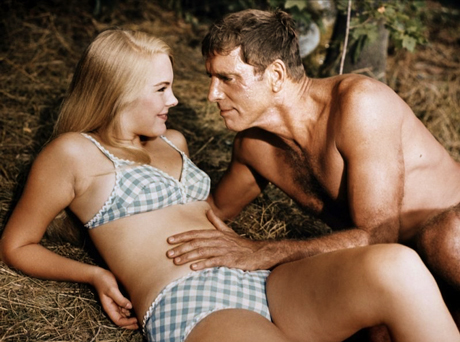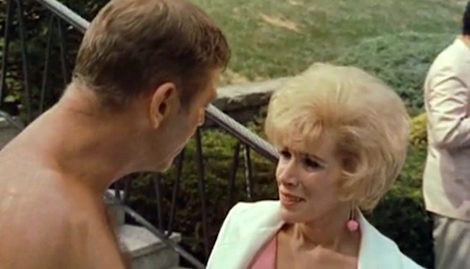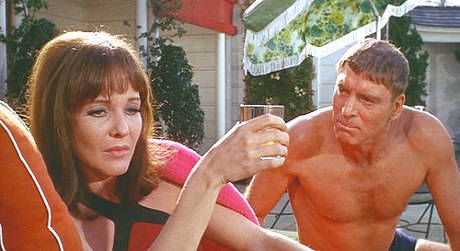|
|
Reviewed by Glenn Erickson
Eleanor and Frank Perry rode a wave of pop liberal filmmaking in the 1960s, a trip that was not without its bumps and potholes. Writer Eleanor was the initial proven talent, but their first art house feature David and Lisa went mainstream and became a crossover hit. It established a template for humanistic movies about sensitive people with personal/psychological/social problems. I love the Perrys' next film Ladybug Ladybug, but it did not do as well. It took them five years to bounce back with 1968's The Swimmer, one of the most daring, original, and non-commercial film ideas of the 1960s yet funded by none other than mogul Sam Spiegel. The story behind the making of The Swimmer is so fascinating that disc fans will be dazzled by the extras on Grindhouse's new Blu-ray - DVD combo release. Seen now, the strangely surreal tale seems quite an achievement. Burt Lancaster was quoted as saying that the film needed a weird Fellini-like style to really work, but he couldn't have been more wrong -- the "upscale suburban surrealism" of this realistic-looking picture is a brilliant conceptual choice.
John Cheever's fairly brief New Yorker story is the basis for a strange Odyssey across a ritzy stretch of Connecticut country estates. Although maintaining a pool in Connecticut is a pricey luxury, it's the new status symbol. Absent for the summer, middle-aged Ned Merrill (Burt Lancaster) shows up poolside at the fancy house of some friends wearing only a pair of swim trunks. Ned's male contemporaries have gained weight or gone to seed, while most of their wives congratulate him on his extreme fitness. Realizing that the collected pools of his friends and neighbors stretch all the way to his house, Ned undertakes to 'swim' his way home, and calls the extended hikes between pools, 'portages.' Ned proceeds in a burst of happiness, and even challenges a horse he encounters to a race. But his progress is troubled by the unexpected new attitudes of the old friends on his route. The happy faces run out and he's soon meeting nothing but disapproval. Nobody says it directly, but friends and foes drop hints that Ned has had financial troubles, or lost his job, or that something unfortunate has happened to the precious daughters he keeps mentioning. Ned encounters former acquaintances that now hate him, for reasons they won't say; others shun him because they think he wants to borrow money, or in retaliation for past slights. Ned doesn't understand any of this, and passively accepts the insults and shouting. It seems he can't do anything right. He's touched when young Julie Ann Hooper (Janet Landgard) talks about how she once babysat for his daughters and felt an attraction for him. But Julie is upset when Ned foolishly hints that he might respond now. Actress Shirley Abbott (Janice Rule) had an affair with Ned, and uses his unwelcome appearance to unleash a flood of verbal abuse and recriminations. Exhausted and limping, with an afternoon cloudburst coming down, Ned just wants to get home as quickly as he can.

The Swimmer was written up by every 1968 critic and reviewer, most of whom had issues with the film's quizzical form. Many just gave up and reviewed Burt Lancaster's body, which takes the grand prize for the most physically fit 52-year-old American male. Eleanor Perry's stylized adaptation of the Cheever story is a dark fantasy without the trappings of black comedy or other satirical formats -- there are no jokes pitched at the film audience and everyone plays everything straight, as if it's all real. And it could be real, as nothing magical or fantastic actually occurs... except that it soon becomes abundantly clear that something is seriously wrong with our displaced Ned Merrill, who doesn't seem to realize that he's become a misfit, a social disturbance or a general nuisance. Ned is quite a bit like those Twilight Zone characters who take an entire show to discover they're not who they think they are -- in at least one interpretation, The Swimmer is a filmic cousin to Herk Harvey's Carnival of Souls, substituting the posh Connecticut social scene for horror movie ghouls.
Sometimes the film resembles the common dream in which one replays petty but unpleasant interactions from the past. It's as if Ned is suffering from amnesia and doesn't remember the social sins he's committed, that exact nature of which are never nailed down. He's a hearty, open-faced guy who loves everything and everybody, yet some of the people he meets remember a different person entirely. Losing one's job and money in this climate of high bourgeois snobbery is enough to brand Ned as a non-person, a threatening outsider. Is Ned having a nightmare about his worst social anxieties? Is that why these people are suddenly so vicious and cruel? Or is Ned in a mid-life crisis, wishing he were free of all the Dorian Gray- like social sins he's committed? On this endless weekend afternoon, everybody is drinking and partying. When Ned wanders uninvited into one of the parties, he's called a gate crasher to his face. Is this the Connecticut version of James Joyce's Ulysses?
The remarkable supporting cast is a dream team of great film and stage actors, none of whom reached Burt Lancaster's star heights. I don't think I was aware of any of them when I first saw the film. Marge Champion, Kim Hunter and Diana Muldaur play country-club wives who approve of Ned. Muldaur's character has been drinking, and she practically invites him to bed. Joan Rivers makes a fine film debut as a party guest momentarily dazzled by Ned's newfound poetic approach to meeting new women. A stern, rich matron (Cornelia Otis Skinner) fixes her hatred on Ned the moment she sees him -- there's been some unexplained bad business about Ned and her son -- and coldly orders him off her property. The same goes for a pair of rich nudists (Nancy Cushman & House Jameson) convinced that Ned is going to commit the unforgivable social sin of asking for money. Ned manages to alienate the young Julie Ann. He even strikes out with a black chauffeur (Bernie Hamilton) convinced that Ned has slighted him. Does the chauffeur feel free to give Ned the cold shoulder because he knows Ned has slipped in status?
The 'service' class exacts its own painful revenge. The great Rose Gregorio and Jan Miner play grocers and caterers apparently left in the lurch because Ned didn't pay the bills he ran up. Miner is particularly vicious and doesn't limit her criticism of Ned to his status as a deadbeat. Ned demanded 'special' mustard for his wife, an exchange that reminds us of those old Grey Poupon commercials.

The one overly obvious episode sees Ned befriending a lonely rich boy, left with a maid and an empty pool while his parents are off on a European trip. And things get ugly when the one of the last pools he must navigate is a public sweat pit packed with screaming kids -- 'swimming' its length is a nightmare. The scenes with children or teens are easily interpreted as reminders of Ned's own aging process, the awareness of death that causes mid-life crisis cases to do foolish things. Although in this case it looks as if Ned has already had his various flings, and the fun he wants is now all in his past.
The acting highlight of the picture could be a one-act play on its own. Ned refuses to leave when his former mistress Shirley (Janice Rule) tells him to take a hike, and they air their contrasting impressions of their illicit romance. Ned knows that the lady's intention is to torture him, yet is crushed by the challenge to his self-image as a stud for all seasons. Yet Ned does his best to seduce her all over again.
We learn in the extras that this scene was re-filmed; the original Shirley was played by Barbara Loden, the noted actress-wife of Elia Kazan, and who later directed the cult film Wanda. A producer since the early 1950s, Lancaster had the clout to override directors he didn't get along with, and did it quite often. According to testimony, Lancaster would re-run scenes after Frank Perry had left the set, changing the direction and the blocking. When they really stopped getting along, this became the norm. At the end of filming Lancaster turned around, brought in his personal pal Sidney Pollack to direct, and redid the Shirley Abbott scene with Janice Rule. Apparently the independent Ms. Loder had her own ideas of how the scene was to be played, or stayed loyal to Perry.
David L. Quaid's cinematography adds some nice visual grace notes when Ned Merril pauses, zooming into the sun, and then into Lancaster's blue eyes. Three editors labored on the picture (at least one of them for the producers after Perry was done), including the famed Carl Lerner. In the sequence where Lancaster races the horse, the screen almost explodes with life and vitality. Lancaster looks like the healthiest, most joyous man alive.
The biggest contribution may be the score from composer Marvin Hamlisch, his first for a feature. It's a phenomenal blast of music, reflecting every mood in the picture without telegraphing climaxes or settling for anything one expects to hear. It's almost like a concert. Seeing pictures like The Swimmer has forced this viewer to sheepishly reconsider Hamlisch, who I once dismissed for rearranging old ragtime music for The Sting.

In short, The Swimmer was quite a surprise -- I was expecting just another 'meaningful' opus from the '60s and instead was surprised with a meaningful (no quotes) movie suggesting that the good life among the well-heeled status seekers is even more selfish, false and hollow than we thought. Not only that but Burt Lancaster's performance is exceptionally good... he's thoroughly invested in the role.
Grindhouse Releasing's Blu-ray + DVD of The Swimmer is a beautiful transfer from Sony/Columbia, restoring Frank Perry & Burt Lancaster's film to its original glory. I only tried watching the picture once on Television in the 1970s, which didn't work at all -- every commercial broke the film's weird spell.
Marvin Hamlisch's music comes across extremely well on the clear soundtrack, and English language subtitles are included.
As for extras, Grindstone may actually have erred on the side of two much -- the multi-part retrospective documentary goes on for 2.5 hours, an hour longer than the film itself. Interviews from the assistant directors, Lancaster's daughter, actresses Janet Landgard and Marge Champion cover the movie so thoroughly that we can practically plot out the shooting schedule on a calendar. Ms. Landgard leads a seemingly endless discussion about Sam Spiegel, Lancaster and the Perrys, and what occurred in the stormy creative power plays on the set and during post-production. The interviews are excellent. In serious, non-comic mode Joan Rivers comes across as a very interesting woman. I'm glad this comprehensive AV document exists, but it takes real commitment to watch the entire thing.
Not only that, but author John Cheever reads the entire New Yorker short story that served as the basis for the film. The stage and film director Stuart Gordon shows his love for the picture in his insert pamphlet liner notes. Galleries contain trailers, TV spots, still galleries and a special set of stills from alternate scenes.
Grindhouse has shown an eclectic taste and a willingness to dig in with good extras that attract disc buyers -- and their presentation does The Swimmer more than justice.
On a scale of Excellent, Good, Fair, and Poor,
The Swimmer Blu-ray + DVD rates:
Movie: Excellent
Video: Excellent
Sound: Excellent
Supplements: 2.5-hour documentary, short story read by John Cheever, Stuart Gordon liner notes, full galleries of extras.
Deaf and Hearing-impaired Friendly?
YES; Subtitles: English
Packaging: One Blu-ray and one DVD in keep case
Reviewed: March 19, 2014
Reader Responses:
1. From "B", 3.22.14:
Dear Glenn: I've always been terribly fond of this movie. Whatever its faults, it is a marvelous adaptation of what would seem an unfilmable short story. I used to have a copy of Eleanor Perry's brilliant script; I kept it around with the idea that if anyone ever said, "well, there are some works that simply defy adaptation," I'd pull it out. This picture should not work at all, and it's largely terrific. The Perrys were very smart filmmakers back in the day, and their approach to this was quite inspired. I wish Lancaster was around to expound a bit on this "Fellini-style" business, because such a concept is really antithetical to the story. The actor's commitment to the role is startling. This is certainly among his best performances -- and few other actors could have even come close to pulling it off.
Your review was quite perceptive. [The analogy to Carnival of Souls is almost a spoiler, but it's entirely on target.] Rule is really good in the movie, but her big scene with Lancaster, though well acted by both performers, is not quite of a piece with the rest of the picture; even in the late '60s there seemed a curious disconnect in style. I don't know whether Pollack (then a close associate of the actor) was exactly wild about re-shooting the sequence, but I believe Lancaster sort of charmed him into doing it. The scene still works, it's just strange somehow. [Watching the film with audiences over the years, its most problematic aspect was clearly Janet Landgard's performance, which would inevitably draw at least some sounds of derision from a crowd. Theatrically, the mostly quite accomplished Hamlisch score also occasionally seemed a little over-the-top.] Best, Always. -- B.
2. Also from "B", 3.22.14:
Glenn: The Twilight Zone analogy is not really inapt. Two of Cheever's most famous New Yorker stories were adapted into pretty good Alfred Hitchcock Presents teleplays. "Five-Forty-Eight" was perhaps a tad too serious and honestly dramatic for the expectations given by the show's format, though the adaptation was excellent and mostly faithful. "O Youth and Beauty" worked very well on all levels. If The Alfred Hitchcock Hour had run an additional season or two, it's not unimaginable that the series would have at least considered adapting "The Swimmer," which was published in The New Yorker in July of 1964. Best, Always. -- B.
3. From Gene Schiller, 3.22.14:
Hi Savant! You mention Lancaster's 'fitness' (he goes through the entire film in a pair of swimming trunks), but I think the metaphor here is vulnerability. It's like a dream where one is naked, exposed.... e.g. you're at a formal function, then discover you've forgotten your pants! That's how the film made me feel.
I remember reading in the trade papers that the film was held up for a year while editors mulled over the final cut. Time magazine gave it a fair review, at least enough to merit a mention in their weekly capsule recommendations, but no one was really crazy about it.
I was just starting to go to the movies on my own, and I credit The Swimmer along with Bonnie and Clyde and Two for the Road with making a film buff out of me. I loved it.... elliptical without being vague; poetic while remaining rooted in reality. I wouldn't call it 'stylish' necessarily, but it had a wonderful feel to it. And you're right, the music by Marvin Hamlisch is a major plus, but no one knew who he was at the time! Anyway, thanks for the great review!
Just received my copy of Blood and Roses - will give it a spin tonite! Best regards, Gene Schiller

Text © Copyright 2014 Glenn Erickson
See more exclusive reviews on the Savant Main Page.
The version of this review on the Savant main site has additional images, footnotes and credits information, and may be updated and annotated with reader input and graphics.
Return to Top of Page
|

